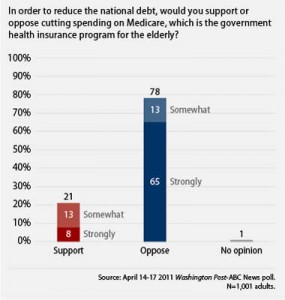NATIONAL
Get the facts in the deliberately deceptive Medicare debate
The following is crossposted from Americans United for Change:
 Mitt Romney, Paul Ryan and their Republican surrogates have mounted a full-scale misinformation offensive attempting to mislead voters that they are the ones trying to “save” Medicare and that Obamacare is what is really ailing the program.
Mitt Romney, Paul Ryan and their Republican surrogates have mounted a full-scale misinformation offensive attempting to mislead voters that they are the ones trying to “save” Medicare and that Obamacare is what is really ailing the program.
Before examining 5 key facts that every voter interested in protecting Medicare for today’s and tomorrow’s seniors need to know and that make clear Romney-Ryan are not being honest with the American people about their proposals that severely undermines Medicare in order to pay for a massive new tax break for millionaires and big corporations — it comes down to who do you trust more.
Do you trust the AARP that concluded that Obamacare “strengthens Medicare by protecting and improving your guaranteed benefits and cracking down on waste, fraud and inefficiency. It also identifies savings that will keep Medicare financially stable for 12 years longer than if the law hadn’t been passed.” The nation’s largest seniors’ advocacy group also concluded of the most recent Ryan budget plan that Romney has fully adopted as his own : “By creating a ‘premium support’ system for future Medicare beneficiaries, the proposal is likely to simply increase costs for beneficiaries while removing Medicare’s promise of secure health coverage.”
Or do you trust the word of Republicans in Washington that opposed Medicare from its inception; the party that tried to make big banks richer by privatizing Social Security and tying up seniors’ otherwise guaranteed benefits in the volatile stock market; the party that voted for Ryan’s extreme budget that independent referees like the Wall Street Journal and the CBO concluded would “essentially end Medicare” and hike seniors out-of-pocket costs by more than $6,000; and the party that is insisting on adopting a “cut, cap, and balance” constitutional amendment that would guarantee severe cuts to Social Security and Medicare?
FACT: No Medicare benefits were or will be cut under Obamacare… period.
 ABC News, July 28, 2012: Fact-Checking Romney: ‘Does Health Reform Cut Medicare, Levy $500 Billion Tax?’ : Medicare spending will continue to grow, according to the Centers for Medicare and Medicaid Services (CMS), but ACA will slow that growth. According to a report from the Kaiser Family Health Foundation over the next 10 years, the federal government will devote about $500 billion less to Medicare than it would have without ACA. CMS and the Kaiser Family Foundation tell ABC News that there will be no benefit cuts to Medicare. They say instead of Medicare’s being cut, there will be much more spending at the end of a 10-year window, but it does slow the rate of that growth. This is all unless Congress makes drastic changes to Medicare, for example passing House Budget Chairman Rep. Paul Ryan’s Medicare Plan. CMS says — and Kaiser agrees — that spending will be reduced by getting rid of fraud and ending overpayments to private insurance companies. It sends a message to those insurance companies: Operate more efficiently.”
ABC News, July 28, 2012: Fact-Checking Romney: ‘Does Health Reform Cut Medicare, Levy $500 Billion Tax?’ : Medicare spending will continue to grow, according to the Centers for Medicare and Medicaid Services (CMS), but ACA will slow that growth. According to a report from the Kaiser Family Health Foundation over the next 10 years, the federal government will devote about $500 billion less to Medicare than it would have without ACA. CMS and the Kaiser Family Foundation tell ABC News that there will be no benefit cuts to Medicare. They say instead of Medicare’s being cut, there will be much more spending at the end of a 10-year window, but it does slow the rate of that growth. This is all unless Congress makes drastic changes to Medicare, for example passing House Budget Chairman Rep. Paul Ryan’s Medicare Plan. CMS says — and Kaiser agrees — that spending will be reduced by getting rid of fraud and ending overpayments to private insurance companies. It sends a message to those insurance companies: Operate more efficiently.”
‘CNN’s O’Brien Corrects Right-Wing Media Medicare Falsehood’ : O’Brien also noted that independent fact-checkers have found that the Affordable Care Act does not cut Medicare benefits. These fact-checkers also determined that the claim that hundreds of billions of dollars have been cut from Medicare is outright false. [Media Matters, August 14, 2012]
Columbia Journalism Review, May 21, 2012: The facts were and still are these: The health reform law, aka the Affordable Care Act, does call for cutting $500 billion from Medicare to help finance subsidies for the uninsured. The administration portrayed these as “savings”—in other words, money not spent for Medicare that could be used for another purpose. But the important take-away is this: the law does not cut a dime from the basic Medicare benefits seniors receive. All seniors will still get hospital benefits, coverage for physician services, lab tests, hospital outpatient care, prescription drugs, and so on, and will continue to receive them unless pols on both sides of the aisle succeed in changing the fundamental structure of Medicare.

WA YELLers Shaunie Saelee and Kamaria Hightower at a July 28 sidewalk parade in Seattle celebrating Medicare/Medicaid’s 47th birthday. (Click for more.)
FACT: Under Obamacare, Medicare’s life was extended by 12 years.
In April 2012, the Congressional Budget Office reported that the Affordable Care Act is expected to cost $50 billion less than they previously anticipated and Medicare actuaries reported that as a result of the savings in the law, the life of Medicare’s Hospital Insurance (HI) Fund is extended to 2024, instead of in 2016.
Center for Budget and Policy Priorities, April 24, 2012: Repealing the Affordable Care Act, a course of action promoted by some who simultaneously claim that the program is approaching “bankruptcy,” would make Medicare’s financial situation much worse. The 2012 report of Medicare’s trustees finds that Medicare’s Hospital Insurance (HI) trust fund will remain solvent — that is, able to pay 100 percent of the costs of the hospital insurance coverage that Medicare provides — through 2024; at that point, the payroll taxes and other revenue deposited in the trust fund will still be sufficient to pay 87 percent of Medicare hospital insurance costs
FACT: Medicare beneficiaries are enjoying more benefits than ever under Obamacare by gradually closing the Part D Rx drug coverage gap for good and offering new free preventive services.
“The Affordable Care Act strengthens Medicare, offers eligible seniors a range of preventive services with no cost-sharing, and provides discounts on drugs when in the coverage gap known as the “donut hole.” [All Details Found Here at HealthCare.gov]
 FACT: Romney endorsed both Ryan-authored Republican budgets that would “essentially end Medicare” and would force seniors to pay thousands more out-of-pocket for their care
FACT: Romney endorsed both Ryan-authored Republican budgets that would “essentially end Medicare” and would force seniors to pay thousands more out-of-pocket for their care
Ryan FY12 Budget Passed by House Republicans on April 15, 2011 Would “Essentially End Medicare:”
Wall Street Journal, 4.4.11: The plan would essentially end Medicare, which now pays most of the health-care bills for 48 million elderly and disabled Americans, as a program that directly pays those bills.
The Economist, 4.5.11: But there is one thing about it that’s fairly clear, regardless of what’s in the details Mr Ryan will announce today: Mr Ryan’s plan ends the guarantee that all American seniors will have health insurance.
New York Times columnist and Nobel-Prize winning economist Paul Krugman, 5/16.11: I know that serious people are supposed to be shocked, shocked at the Democrats calling the Ryan plan a plan to dismantle Medicare — but that’s just what it is. If you replace a system that actually pays seniors’ medical bills with an entirely different system, one that gives seniors vouchers that won’t be enough to buy adequate insurance, you’ve ended Medicare. Calling the new program “Medicare” doesn’t change that fact.
Talking Points Memo, 6.14.11: Here’s Tom Scully — former Bush administration director of the Center for Medicare and Medicaid Services — on the Republican plan, in an interview with me. “It gets rid of — and I would do that — gets rid of the current Medicare program where the government is the insurance company and the government sets the prices.”
Center on Budget and Policy Priorities, 4.7.11: The first year the voucher would apply, CBO estimates that total health care expenditures for a typical 65-year-old would be almost 40 percent higher with private coverage under the Ryan plan than they would be with a continuation of traditional Medicare. CBO also finds that this beneficiary’s annual out-of-pocket costs would more than double — from $6,150 to $12,500. In later years, as the value of the voucher eroded, the increase in out-of-pocket costs would be even greater.
National Journal, June 6, 2011: “Safe Over 55? Maybe Not. Republicans say their Medicare plan wouldn’t affect anybody near retirement age. But it would.” : The policies in the House GOP budget, if enacted, would begin affecting millions of seniors almost immediately by increasing their costs for prescription drugs and probably long-term care. Further, Medicare costs could rise over time if healthier seniors choose to abandon the traditional benefit program.
 Ryan FY13 budget that House Republicans passed on March 29, 2012 would “lead to the gradual demise of traditional Medicare:”
Ryan FY13 budget that House Republicans passed on March 29, 2012 would “lead to the gradual demise of traditional Medicare:”
“Shifts substantial costs to Medicare beneficiaries”, “Lead to the gradual demise of traditional Medicare” According to the Center on Budget and Policy Priorities: “The budget resolution developed by House Budget Committee Chairman Paul Ryan (R-WI) would make significant changes to Medicare. It would replace Medicare’s current guarantee of coverage with a premium-support voucher, raise the age of eligibility from 65 to 67, and reopen the “doughnut hole” in Medicare’s coverage of prescription drugs. Together, these changes would shift substantial costs to Medicare beneficiaries and (with the simultaneous repeal of health reform) leave many 65- and 66-year olds without any health coverage at all. The plan also would likely lead to the gradual demise of traditional Medicare by making its pool of beneficiaries smaller, older, and sicker — and increasingly costly to cover…The (CBO) projects that under the Ryan budget, federal Medicare expenditures on behalf of an average new beneficiary would be $400 to $700 (6 to 11 percent) less in 2023, $1,200 to $2,200 (14 to 23 percent) less in 2030, and $5,900 to $8,000 (35 to 42 percent) less in 2050 than under current law.” [Center on Budget and Policy Priorities, March 28, 2012]
Slashes Medicare Benefits by Raising Eligibility Age to 67: “The plan would gradually raise Medicare’s eligibility age from 65 to 67 for people turning 65 in 2023 and thereafter, even as it repeals health reform’s coverage expansions. This could leave 65 and 66 year olds who can’t get employer-based coverage out in the cold. People with modest incomes generally wouldn’t be able to afford the prices that private insurance companies would charge to cover people in this age bracket.” [Center on Budget and Policy Priorities, March 21, 2012; March 19, 2012]
AARP: “By creating a “premium support” system for future Medicare beneficiaries, the proposal is likely to simply increase cost for beneficiaries while removing Medicare’s promise of secure health coverage — a guarantee that future seniors have contributed tothrough a lifetime of hard work…The premium support method described in the proposal – unlike private plan options that currently exist in Medicare — would likely “price out” traditional Medicare as a viable option, thus rendering the choice of traditional Medicare as a false promise. [AARP letter to membership, March, 21, 2012]
The Hill, 03/20/12: “CBO: Policies Would Cut Medicare Benefits” : By 2030, average government spending on each new Medicare enrollee would be about $2,000 less under Ryan’s plan than the status quo. In 2050, Medicare’s per-person spending would be about 42 percent lower under Ryan’s proposals.
“Fewer Health Services” Thanks to Ever-Shrinking Private Insurance Vouchers: “Once seniors reached the age of eligibility for Medicare, they would receive a premium-support voucher to help them buy coverage… Seniors who couldn’t afford to spend more than the voucher amount likely would have to purchase insurance that covered fewer health services as time went by, since the voucher likely would not keep pace with increases in health care costs.” (See What You Need to Know About Premium Support) [Center on Budget and Policy Priorities, March 21, 2012]
And worth noting: Associated Press, Aug. 15, 2012: “The other Paul Ryan plan: $800B in Medicaid cuts” : Converting Medicaid into a block grant would end the current right to coverage under federal law, and it remains unclear what rights could be preserved. Most analysts say states would insist on the flexibility to reduce their Medicaid rolls. The Urban Institute estimates that between 14 million and 27 million people would lose coverage because of Ryan’s spending restrictions.
Both Ryan’s End-Medicare Plans = Romney’s End-Medicare Plans:
ABC News, Aug 13, 2012: Mitt Romney’s Medicare Plan Is Essentially Paul Ryan’s: ‘Paul Ryan’s 2013 budget plan, passed by the House in March, includes a lot of things, and Mitt Romney has endorsed it in the past, telling Wisconsin supporters in a tele-town-hall meeting four days after the House passed it. “I think it’d be marvelous if the Senate were to pick up Paul Ryan’s budget and to adopt it and pass it along to the president,” Romney said.
Politico, Aug. 13, 2012: ‘Romney ducks on Medicare differences’ : ‘Romney declined to explain any differences between his plans to change Medicare and those included in Paul Ryan’s budget proposal during a campaign stop in Florida Monday.”We haven’t gone through piece by piece and said, here is a place where there is a difference,” Romney said, when asked by reporters about how his budget would differ. Asked again about the differences, Romney said, “There may be, we’ll take a look at the differences.” Asked a third time, Romney still did not list a difference.
Think Progress, Aug. 11, 2012: ‘Five Times Mitt Romney Has Embraced The Ryan Budget’
ABC News, June 2, 2011: On health care, Romney responded “yes” when asked if he would sign the plan written by Rep. Paul Ryan that would restructure Medicare if it reached his desk as President.
 FACT: Without benefit cuts, Obamacare reins in waste, fraud and abuse in Medicare, reforms provider payments to promote greater efficiency, and ends wasteful subsidies to insurance companies to inefficiently and more expensively reinvent the Medicare wheel under the so-called Medicare Advantage program — But Romney would restore and perpetuate this $700 billion worth of wasteful spending.
FACT: Without benefit cuts, Obamacare reins in waste, fraud and abuse in Medicare, reforms provider payments to promote greater efficiency, and ends wasteful subsidies to insurance companies to inefficiently and more expensively reinvent the Medicare wheel under the so-called Medicare Advantage program — But Romney would restore and perpetuate this $700 billion worth of wasteful spending.
Talking Points Memo, August 12, 2012: The Affordable Care Act included $700 billion in reimbursement reductions under Medicare to hospitals, drug companies and supplemental private insurance plans, in an effort to slow the cost growth of the program. Benefits remain untouched; the cuts only target providers.
Think Progress, Aug. 12, 2012: ‘Romney Claims Obama ‘Robbed Medicare’ To Distract From GOP Plan To End Medicare’: The $716 billion figure comes from the Congressional Budget Office’s latest estimate of the Republican proposal to repeal the law, though the office doesn’t back up the charge that Obama stole the money from the current Medicare budget. Rather, the savings slow the growth of Medicare over the next decade: eliminate overpayments to private insurers, reform provider payments to encourage greater efficiency, tie reimbursements to improvements in economic productivity, and reduce fraud and abuse.
Think Progress, Aug. 15: ‘How Mitt Romney Would Quickly Bankrupt Medicare’ : Despite endorsing Paul Ryan’s proposal to maintain Obamacare’s $716 billion in Medicare cuts and reduce overall Medicare spending from 7 percent of GDP to 3.5 percent by 2023, Mitt Romney has announced that he would restore the ACA’s reductions — and avoid future Medicare reductions. The Obamacare savings slow the growth of Medicare over the next decade by, in part: eliminating overpayments to private insurers in Medicare Advantage, reforming provider payments to encourage greater efficiency, tying reimbursements to improvements in economic productivity, and reducing fraud and abuse. CMS offers a partial breakdown – CLICK HERE TO VIEW CHART.
Economic Policy Institute, May 14, 2009: “In a nut shell, Medicare Advantage plans are private plans funded through Medicare to provide similar benefits, but at a 14% higher cost on average, according to the Medicare Payment Advisory Commission (MedPAC), an independent Congressional agency. Eliminating these overpayments would free up $157 billion over 10 years.
Center on Budget and Policy Priorities, September 14, 2009: “The overpayments, which have totaled nearly $44 billion between 2004 and 2008, average more than $1,100 for each beneficiary enrolled in a private plan. By increasing Medicare costs, these overpayments also drive up premiums for beneficiaries in traditional Medicare by $86 per year for a couple, according to the chief actuary at the Centers for Medicare and Medicaid Services. More than 31 million seniors and people with disabilities enrolled in regular Medicare are forced to pay higher premiums each month to subsidize these excess payments.’
And Just to Note: Despite Republican claims Obamacare would devastate Medicare-Advantage, enrollment is actually up and premiums are down this year: SEE Kaiser Family Foundation Report, 2012-06-11: http://www.kff.org/medicare/8323.cfm
Side-By-Side: When It Comes to Trimming the Costs of Medicare, Not All Cuts Are Created Equal:
It’s understandable why Romney is desperate to mislead voters about his plan to mike seniors’ health care costs while giving millionaires another tax break: Medicare is popular and Ryan-Romney’s plans to end it are radioactive:
Washington Post-Kaiser Family Foundation poll, July 25-Aug. 5, 2012: 79 percent of registered voters oppose reducing Medicare benefits to pay for the deficit.
Democracy Corps battle ground poll called the Ryan budget “the last straw” for swing voters in Republican congressional districts, with 72 percent of seniors and 60 percent of independents saying they have very serious or serious doubts about a Ryan plan that would put more of the cost of Medicare on seniors.
It Comes Down to Trust. And given Mitt Romney’s troubling history with Medicare, can he really be trusted to protect it for today’s and tomorrow’s seniors?
Forbes, 1/21/2012: ‘Romney Supervised Medical Testing Company Guilty Of Massive Medicare Fraud’





